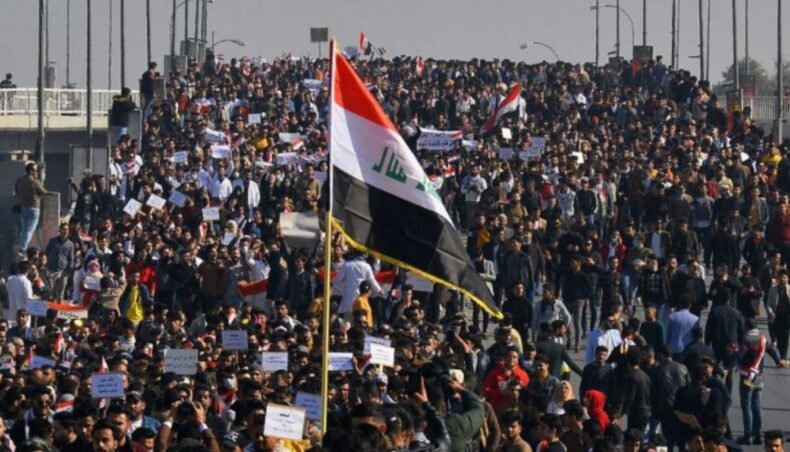Hundreds of protesters, largely Muqtada al-Sadr’s followers in Iraq, enter the heavily guarded Green Zone to demonstrate against the choice of a rival coalition as prime minister.
Hundreds of Iraqis took to the streets, the majority of them supporters of Muqtada al-Sadr, the country’s foremost Shia figure, to protest the candidacy of Iran-backed parties for prime minister.

When the protestors broke into the capital’s high-security Green Zone on Wednesday, which houses governmental institutions and diplomatic embassies, there were no legislators present in parliament.
Only security personnel were present inside the structure, and they looked to have made it quite easy for the demonstrators to enter.
The pro-Iran Coordination Framework’s choice for premier, former minister and ex-provincial governor Mohammed Shia al-Sudani, is opposed by the demonstrators.
The demonstrators were instructed to “immediately remove” from the Green Zone, according to Prime Minister Mustafa al-Kadhimi.
In a statement, he issued a warning, noting that security personnel would be responsible for “protecting state institutions and foreign missions, as well as preventing any disruption to security and order.”
Al-coalition Sadr became the largest faction in the 329-seat parliament after winning 73 seats in the October 2021 elections in Iraq.
The formation of a new government, however, has stagnated since the referendum, and al-Sadr has resigned from the political arena.
On Wednesday, protesters held images of the Shia leader.
Earlier, riot police used water cannons to stop protesters from tearing down cement blast barricades. But several managed to get past the area’s barriers.
Numerous protesters gathered outside the parliament building as the demonstrators marched down the main street of the Green Zone.
“Al-Sudani Get Out”
At the entrances to the major gates, riot cops gathered. Two Green Zone entrances were congested with protesters, some of whom were climbing the cement wall while yelling “Al-Sudani, out!”

Mahmoud Abdelwahed of Al Jazeera reported from Baghdad that the demonstrators had travelled from “several places” throughout Iraq.
He stated, “They want to make it clear that they are opposed to corruption and crooked leaders.
They claim that the nation has endured many years of corruption and poor management, and they promise to keep protesting peacefully.
After his supporters entered parliament, al-Sadr issued a post on Twitter telling them their message had been received and urging them to “return safely to your homes.”
This was a sign that the sit-in would not continue to escalate.
Soon after, under the watchful eye of security personnel, demonstrators started to leave the parliament building.
The event and al-subsequent Sadr’s demonstration of authority over his supporters served as an implied warning to the Framework party about a potential uptick in tensions if al-Sudani is chosen to lead the next government.
Leader of the State of Law and former prime minister Nouri al-Maliki chose Al-Sudani. Parties must first choose a president before al-Sudani can go before parliament to be officially sworn in as prime minister-designate.
Al-Sadr withdrew from discussions about forming a government because he was unable to round up enough MPs to secure the majority needed to choose the future president of Iraq.
The leader of the Framework accelerated the process of forming the new administration by removing al-Sadr’s legislators.
Many people got worried by doing so, instability and public protests organized by al-Sadr’s grassroots support will also be allowed to flourish.
In a similar manner, al-Sadr supporters stormed the parliament in 2016. After then-Prime Minister Haidar al-Abadi attempted to replace party-affiliated ministers with technocrats in an anti-corruption drive, they staged a sit-in and voiced demands for political reform.
Al Jazeera was informed by Yerevan Saeed of the Arab Gulf States Institute in Washington that al-Sadr intended for the protests on Wednesday to show his competitors that he is still “politically relevant.”
‘Intra Shia Civil War’
It is clear that the game is extremely risky. Yerevan Saeed warned that it might lead to civil unrest among Shi’ites in the nation.
Iraq’s lack of a budget for 2022, caused by the country’s political unrest, is delaying expenditure on urgently needed infrastructural improvements and economic transformation.
Iraqis claim that the scenario is making it harder to find services and jobs, despite the fact that Baghdad is earning record oil revenues due to high crude prices and that there haven’t been any significant wars since ISIL (ISIS) was defeated five years ago.













